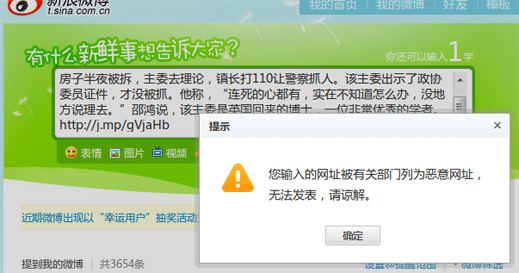Study Reveals Techie Terms Censored Online in China
China’s surveillance of its citizens’ digital activities is common knowledge. However, questions remain concerning what content is targeted by government censors and how these blacklists change in response to current events.

A new study released this month in First Monday uncovers more than 4,000 unique keywords censored over the last year and a half on Chinese instant messaging platforms. Focusing on Skype and the microblogging service Sina Weibo, the researchers cultivated their keyword list using reverse-engineering techniques such as packet sniffing, which captures and analyzes packets of data as they pass through a network.
More than 20% of the terms targeted on Sina Weibo, it turns out, related to technology, including specific URLs, spyware, and technical terms. Some of these keywords, such as “Chinese language Wikipedia” and “Google Blogger,” referred to popular websites dedicated to the open dissemination of information. (Censorship of Chinese Wikipedia was first spotted nearly ten years ago on the anniversary of the Tianmen Square protests.)
Generic terms like “system,” “administrator,” and “system notification” also appeared on the keyword list. The researchers hypothesize that these more general keywords might be used to catch anyone attempting to impersonate a Sina Weibo administrator and thus wield power over other users’ accounts.
Other common words targeted by censors include “internet,” “chat,” “world wide web,” and “Chinese person.” Additionally, the researchers found that the censor’s keyword lists fluctuated in response to major events. For example, after the Arab Spring began in late 2010, and some began calling for similar protests (or Jasmine Rallies) in China, dozens of related keywords were added to the censorship lists. 69 of these keywords were then abruptly removed for several weeks in May 2011, which the researchers interpreted as a possible attempt to monitor protester mobilization.
Keep Reading
Most Popular
Large language models can do jaw-dropping things. But nobody knows exactly why.
And that's a problem. Figuring it out is one of the biggest scientific puzzles of our time and a crucial step towards controlling more powerful future models.
How scientists traced a mysterious covid case back to six toilets
When wastewater surveillance turns into a hunt for a single infected individual, the ethics get tricky.
The problem with plug-in hybrids? Their drivers.
Plug-in hybrids are often sold as a transition to EVs, but new data from Europe shows we’re still underestimating the emissions they produce.
Stay connected
Get the latest updates from
MIT Technology Review
Discover special offers, top stories, upcoming events, and more.